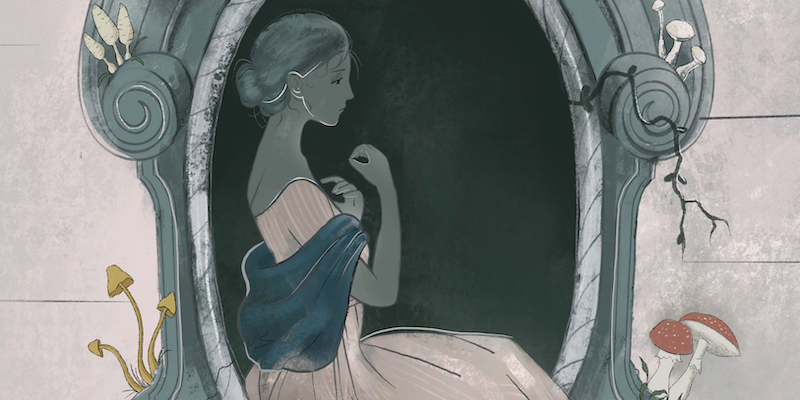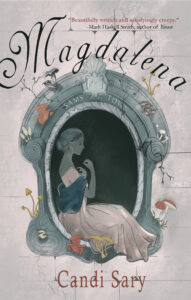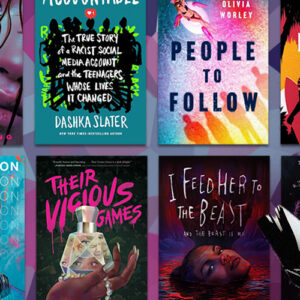As a kid, I was mesmerized by the eerie tales my grandmother told about ghosts from her childhood in Croatia. My older sisters and friends captivated me with creepy stories when Light as a Feather, Stiff as a Board took our slumber parties into séance mode. In dark bathrooms, the neighborhood kids swore that Bloody Mary showed up in the mirror when we chanted her name. I was excited to play along, but I never opened my eyes. Was I afraid of seeing her? Or was I afraid of not seeing her? I didn’t want to encounter a scary ghost, but I did want proof they were real.
Profoundly afraid of death, I clung to the belief that when my loved ones died, I’d never really lose them. My Catholic upbringing told me to believe they’d be in Heaven, but I wanted more. I wanted my dearly departed to come down from the clouds and visit me now and then, like the spirits in my grandmother’s tales. This longing for the dead to stick around made ghost stories my favorite kind of stories. And they still are. As a writer, ghosts keep showing up in my novels. Recently I was asked by a reader if I’ve had real experiences with the other side. My answer is a definite I think so. Or maybe more accurately, I hope so.
My grandfather, who often told me I was his favorite and died when I was eighteen, helps me find things I’ve lost. Once when I’d misplaced my keys and spent hours looking for them, I asked my grandpa out loud if he could show me where they were. Within minutes, he guided me to the couch cushion they’d slipped under.
My old neighbor and dear friend Bob, who died in his 80s, sends me pennies to say hello. How do I know this? At the funeral, a neighbor told us that her son dreamt about Bob throwing pennies from a roof. The next morning she received an email chain about angels throwing pennies from Heaven. I took it as a sign and began paying attention. Once, on a walk with my husband and kids, I brought up a memory of Bob, and right there on our path were four pennies placed neatly in a row. I’d often find them in front of his old house, and on difficult days, a penny sometimes appears in the most unexpected places.
Then there’s our close friend Rus, who sets off our smoke alarm when he wants us to send his wife Temre a message. At 2am, the night after he died our smoke detector blared for no reason. It had never done that before. It happened again on the first Father’s Day after he passed, which was also his wife’s birthday. It went off a handful of other times, including the night we had a book launch party at the house and I was telling a writer friend about this phenomenon—shortly afterwards, with all the guests still there, the alarm started howling upstairs.
I’m not certain who the ghost was that turned on music downstairs one morning at 3am, waking me with an eerie song I’d never heard before. I did recognize Chris Martin’s voice, so the next day I looked up Coldplay songs and discover “Death and All His Friends” had woken me. Really. That was the name of the song. I have no explanation for this one, but since I was writing a ghost story at the time, I told myself that someone was trying to come through.
I have plenty more examples that don’t sound as convincing in writing as they do in my head. My rational brain doesn’t really buy into these coincidences. It’s my imagination that drinks up this stuff like sugar water. It’s too delicious to deny. So when Shirley Jackson, the queen of ghost stories, showed up while I was writing my novel MAGDALENA, which is also a ghost story, my cup overflowed.
I hadn’t ever read Jackson’s work when I randomly came across a quote online that was the absolute perfect epigraph for Magdalena.
“No live organism can continue to exist sanely under conditions of absolute reality; even larks and katydids are supposed, by some, to dream.”
Who was this writer? I wondered. The quote was breathtaking! Magdalena is very much a novel about the power and need for imagination. This eloquent sentence set the tone beautifully, and every time I opened my manuscript, I reread her words that kept me in the dream of my novel.
I was working on rewrites when I finally read Jackson’s We Have Always Lived in the Castle. I fell in love with her writing and quickly picked up another novel. You can imagine my surprise when I opened The Haunting of Hill House to find that the quote I had chosen for my epigraph was the very first line of the novel! I had no idea it came from a ghost story. I’d only chosen it for its take on imagination. This discovery made the presence of Jackson’s words even more meaningful.
As I sat thinking about this fantastic coincidence, the magic grew, and my mind went to that far off place it always goes when I write, the place where serendipity gives my stories wings.
Perhaps the queen of ghost stories had sent that quote to inspire me.
My rational brain tried to stop the nonsense, reminding me that the spirit of Shirley Jackson had far more important people to haunt than me.
But maybe I was the only one listening.
I decided that Shirley Jackson had given something to me, not necessarily through the intervention of a ghostly hand, but through the magic of words—the way one’s words live on after death. I took in her profound sentence whenever I opened my manuscript and, as Dottie says in Magdalena, “…her words were little ghosts themselves,” visiting me every day. They gave me permission to write a novel that doesn’t fit within the confines of absolute reality, a novel that wanders into the peculiar mysteries of this wondrous existence. Shirley Jackson influenced my writing by giving me permission to dream. Just like the larks and katydids. For she knew that staying too grounded is not how you give a story its wings.
***


















